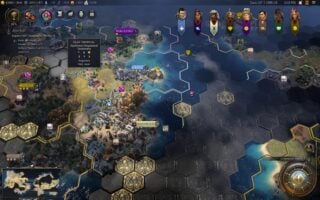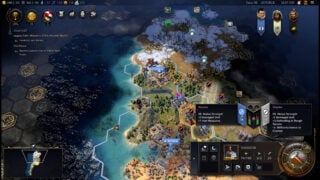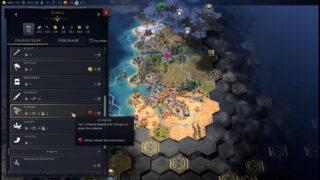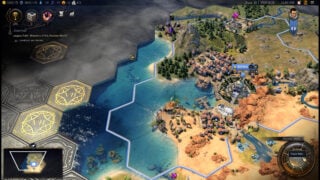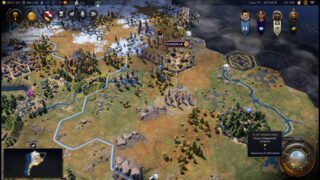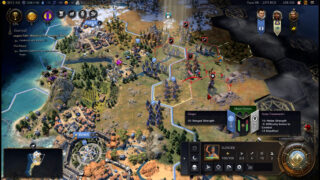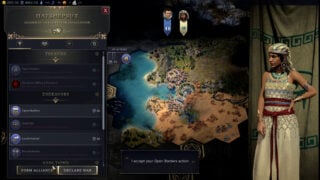Sid Meier’s Civilization 7 Review: The ultimate cozy, war-mongering strategy game
Civilization 7 makes big changes to its strategy formula, without spoiling what fans love about the series
- Creative Director
- Ed Beach
- Key Credits
- Dennis Shirk (Executive Producer ), Andrew Frederiksen (Lead Producer )

Civilization and Football Manager are like birds of a feather, mainly because when a new one comes around, my poor partner’s life is consumed by stories of my successes and crushing defeats.
Few series so effortlessly create unforgettable moments of emergent gameplay that, to me, I am long past playing these games for the mechanics themselves or to challenge myself on the highest difficulty, but instead for the fun, daft, “only in Civ,” things they throw up.
Sid Meier’s Civilization 7 is absolutely full of them. From a new influence system that adds even more stakes to your conversations with other leaders, to the eras system that changes the tempo of matches entirely, Civilization 7 is an earned new entry, and a game we’ll keep installed for years.
The new Eras system is Civilization 7’s biggest change. While previous games would notify players when someone reached the bronze age, or the medieval age, for example, Civilization 7 treats the three separate ages almost as separate games themselves.
Many of the things you build in one age won’t translate over to the next. Units will no longer be available, and the state of the game can fluctuate wildly. For people who don’t have an entire life to spend on a game of Civ, this is a nice break in play and makes the games more manageable, one of several things I think were influenced by the game’s success on handheld platforms.
For players who are going to finish a game in one sitting, however, it changes the way veteran players think about the board in front of them. A change in era ends all wars, for example, so if you’re under the cosh, it’s often advantageous to play defensively, because you know the second the era flips to the next one, you’re in the clear.
Civilization 7’s new influence system is another game-changer for the new iteration. The currency, which can be used in negotiations with other leaders, changes how you interact with the rest of the players on the board. Now, actions like denouncing, opening borders, establishing freidnships and more, all cost influence.
Not only can you spend your currency on these actions, but you can also force other players to spend theirs based on your proposals. For example, another leader may suggest open borders or a cultural festival that will benefit both players. If I agree to this, it will cost me 90 influence, but if I send a neutral response, it will be free. However, I will only receive a small benefit.
I assume this is designed to stop players from hoarding influence, which can be massively effective when you plan to go to war. When war does break out, you can spend influence to turn the tide of battle your way. This means that your enemy civilians will develop war weariness, and their army will be weaker.
“Civilization 7’s new influence system is another game-changer for the new iteration. The currency, which can be used in negotiations with other leaders, changes how you interact with the rest of the players on the board.”
I’m in two minds about this system, mainly due to just how effective it is if you’re launching a military campaign. With the correct amount of influence, it’s so simple to barge across the borders and launch an all-out assault without giving your enemy a chance to respond.
The AI was incredibly war-happy during my time with the game, and were, in typical Civ fashion, about as subtle as a house fire when setting up pre-war. Suddenly, there are scores of enemy soldiers lining my borders, all while their leaders are happy and cordial.
The reliance on war is a key issue with Civilization 7, and the series as a whole. There’s still no way to science someone to death in the mid-game. You might as well be a warmonger because it’s the only way to take enemies out of the game during the middle period. Without this, it’s basically an all-out sprint to cultural and scientific victories.

Each of the victory types has new win conditions, which are shown to the player via quests. These change with each age, and also serve as a good way to explain to new players what they should actually be aiming for. The science path, for example, might first focus on discovering mathematics, then a university, and then eventually, future tech. For military victory, you’re either colonizing the world or having enough religious influence in other territories to establish control.
There is a danger that these quests make the game like following Lego instructions where it’s laying out exactly what you should do, but on greater difficulties, these serve far more as guidelines, and how you actually color in the picture is up to you.
There are also side quests that provide great bonuses, but some of them can be rather harsh. We received a side quest that asked us to have 3-fully leveled army commanders in the next 30 turns, something that would have been virtually impossible unless we were to guess that quest was on the way.
“The AI was incredibly war-happy during my time with the game, and were, in typical Civ fashion, about as subtle as a house fire when setting up pre-war.”
Civilization 7 is slimmed down in a smart way, likely due to how successful the series has been on both Steam Deck and Nintendo Switch. The game is Steam Deck verified at release, and while our time with that version has been short so far, it’s going to be a firm companion on flights going forward.
The Civ team has been rather open about how the Switch has influenced how the game is developed, and it’s for the better. Menus are cleaner, there’s virtually no microscopic text, and the tech trees are much simpler to understand. This isn’t “dumbing down,” it’s just making the game far more readable on a small screen without smashing it against your eyes.
Civilization 7 remains the premier evening and weekend thief in my life. Despite the mass casualties of absolute constant war, it’s a genuinely cozy game. Cozy in the sense that if you sat down in front of it on a Friday afternoon, you’d fly through campaigns, box sets tumbling in the background, before suddenly realizing it was Sunday.
The changes here are smart but don’t break the established formula, and there’s slimming down and streamlining throughout that are clearly influenced by the game’s handheld success. Combined, this means Civilization 7 is a confident, sleek and another high watermark for strategy games.
Civilization 7 Review
Civilization 7 is bold enough to add big changes to its formula, without getting rid of everything that has made the series iconic. Say goodbye to your free time, as from PC to handheld, every waking moment will be consumed by One More Turn.
- Classic Civ gameplay never goes out of style.
- New influence system makes leader interactions more important.
- Switch-influenced changes make the game sleaker.
- The eras system adds a new dimension to weekend-long battles.
- The new crop of leaders don't inspire.
